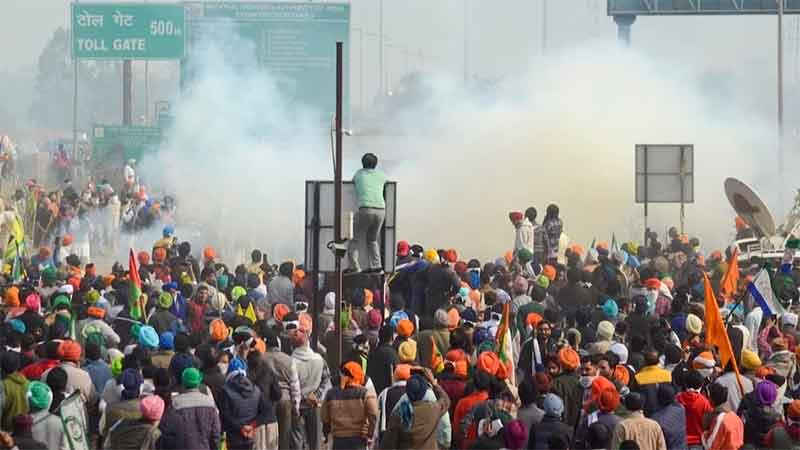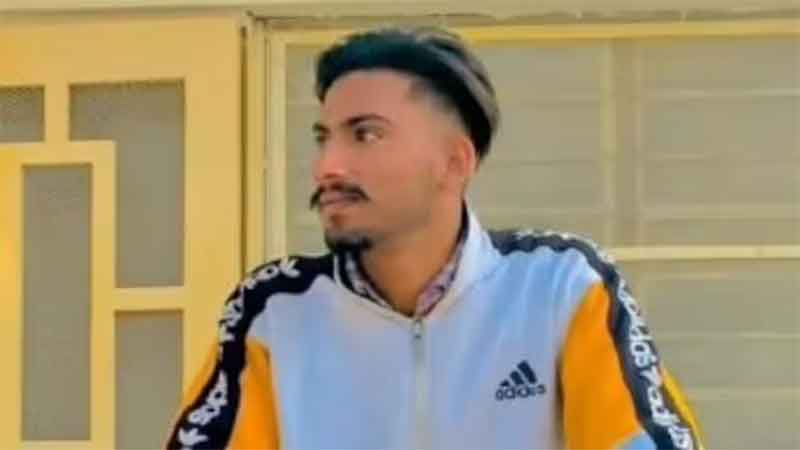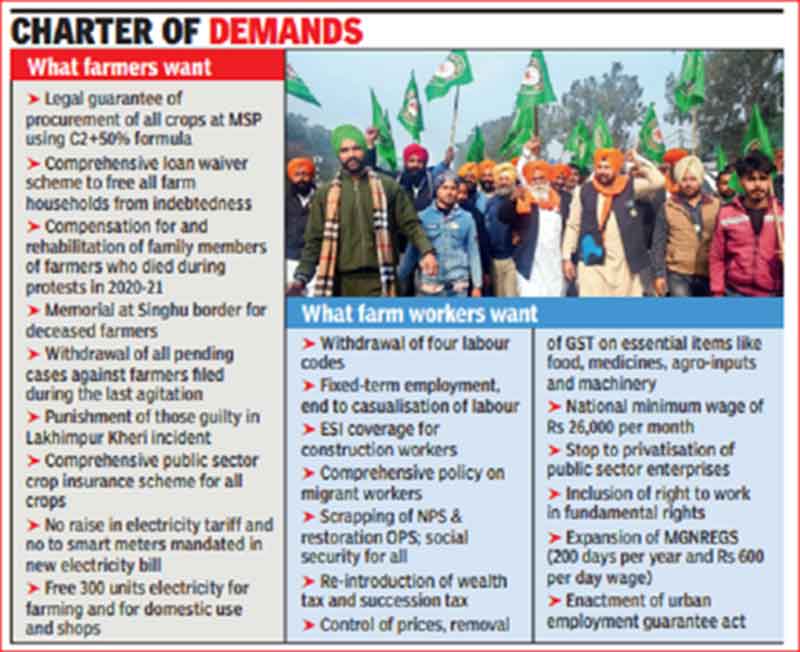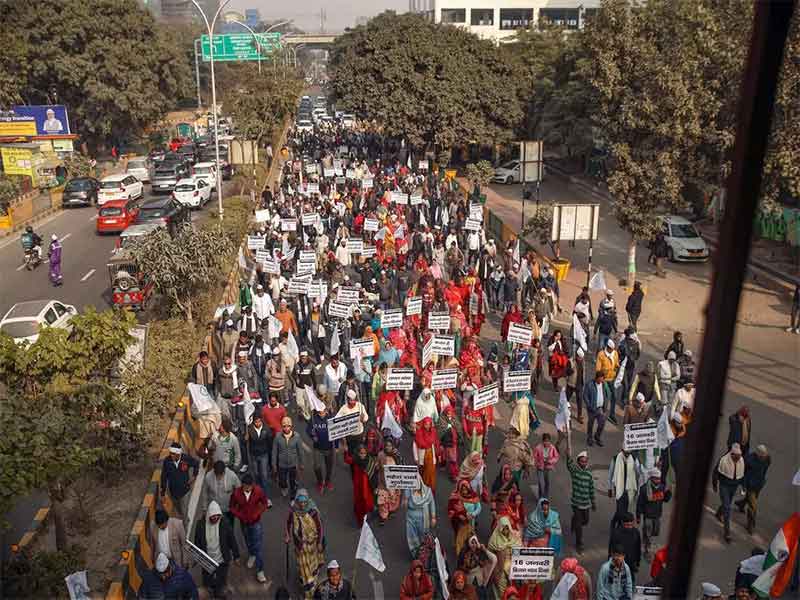
The farmer’s organisations of the Samyukta Kisan Morcha have decided to vacate from the Tikri border and temporarily withdraw the agitation. After a letter from the ruling party it undertook this step. All the leaders of the major farmer’s organisations left no stone unturned, in thanking all the families and persons who volunteered, including those of ruling class parties. The farmers have said, they will vacate the Delhi borders on Saturday and will meet on January 15.
Calling it a “historic victory of farmers struggle”, Sanyukt Kisan Morcha (SKM), an umbrella of over 40 farm unions, on Thursday, December 9, announced to suspend its ongoing agitation on December 11, which, they said, will mark nationwide victory day. In a press statement, the five member committee of the SKM, said, the Union Ministry of Agriculture and Farmers Welfare had sent a letter to the organisation on December 9 morning, as per the draft approved by the SKM meeting the previous day. “The letter was placed and approved in the SKM meeting today,” the statement said. Maintaining that the SKM had already won its first historic victory when the Prime Minister announce the repeal of the three controversial farm laws on November 19, the statement said, “It has been decided to suspend the farmers struggle at the Delhi borders and the toll plazas from December 11.” “On January 15, the SKM will meet in Delhi to review the progress of the government’s assurances and take further decisions as may be necessary,” the statement read, adding that the SKM would be further strengthened all over the country.
Meanwhile, the farmers protesting at the Singhu border have started removing their tents. They were also seen exchanging sweets.
Pavel Kussa Views.
BKU(Ugrahan) coordinator and Surkh Leeh editor, Pavel Kussa mentioned how the ruler’s responded to farmers genuine demands like loan waivers and compensation, Minumum Support Price and Electricity amendment bill after a considerable delay. Ultimately they responded in a new draft, after their first draft was rejected by the farmers. On December 7th it delivered a new letter. Previously it gave a letter on November 19th, which the Samyukta Kisan Morcha rejected.
Pavel redressed how the government in the new draft heeded to the demand of unconditionally withdrawing all the cases, even out of the Union territory of Delhi., which it denied previously. The Samyukta Kisan Morch gladly accepted them, but Pavel felt the farmers should still be critical. Earlier the govt made it unconditional, but now reversed that declaration.
It also agreed to form a committee as before including, the leaders of the Samyukta Kisan Morcha, to deal with the aspect of the Minimum Support Price. However now it introduced a mandate to the first draft. Still it does not give a legal guarantee.
Another important aspect was on the Electricity amendment bill, which the rulers pledged to withdraw.Pavel spoke about how it did not only concern the farmers, but the broad sections of people as the whole. The govt declared they would discuss it with the stakeholders.
Govt also lifted penalties on the farmers, unconditionally as well as offered compensation to the farmers. However still Pavel mentioned how one section was still trapped with penalties.
Pavel stressed on how the farmers must be vigilant of al govt promises and morally sustain the struggle and unity. Not even for a day should the people dilute the pressure. He reflected how new forms should be devised of undertaking struggle. In his view priority must be given for compensation to the Laxmi kherpuri victims and punishment to the culprits. He still asserted that all the aspects were addressed in convenience of the rulers making twists and turns and not with the perspective of the progress of the farmers.Pavel spoke about how the rulers still danced in tune with the corporates, and by no mean should the people place blind faith. In his view Minumum Support Price was the most important issue.
Overall still Pavel felt the movement was on appositive road, and praised it’s achievements.
I recommend all to listen to the Pavel Kussa speech on youtube.
Views of Joginder Singh Ugrahan.
A most prospective interview was undertaken by the Caravan from Joginder Singh Ugrahan,brimming with self-confidence. He expressed how the rulers were embarrassed in their very backyard and were compelled to withdraw the bills. Most illustratively it summed up and linked all the important aspects, integrating all the important factors. I recommend all to read his inspiring interview by Prabhjit Singh, obtaining even the complete version.
Ugrahan said that the withdrawal of the laws was only the first part of a long fight for democracy in the country. Inspite of a constant ebb and flow in fortunes the Modi government was determined to destroy this farmers’ movement. However it evolved from being a farmers’ movement to a people’s movement. The government intended to suppress it the manner it had earlier curbed the anti-CAA movement, by inciting communal violence [referring to riots in Delhi, in February 2020 that followed the protests]. Ugrahan summarised how it intended to repeat deliberations here, by hatching a conspiracy on 26 January, by branding them separatist Sikhs. However they we remained unflinched and united,inspite of the loss of over 700 lives. The Lakhimpur kheri killings and then the killing of a poor man at the hands of a Nihang leader was also part of a broader BJP conspiracy to derail the movement but the spirited resistance from people all over India thwarted it.Ugrahan asserted how the protests sharpened the sword of democracy, rejuvenating a new confidence or courage in the people.
In his view in no way did that move guarantee a victory for the BJP in many states, with peoples wrath reaching a boiling point in states like even Uttar Pradesh and Haryana.Ugrahan highlighted how it was not just the BJP that had to be confronted, but the ideology of Hindutva nationalism as a whole. Whether in Punjab, Uttar Pradesh or Uttarakhand, or even anywhere else in India, the withdrawal of these laws doesn’t mean ascendancy for the BJP. He asserted that the anti-people decisions taken by the BJP since it came to power in 2014, like demonetisation, the annulment of Article 370, the land acquisition law, the NRC and CAA, continue to be discussed and opposed and with utmost commitment his organisation would expose the nefarious role of the RSS since 1947 and also before the country’s independence. He pledged that democratic forces would continue to wage resistance to the misdeeds, giving vivid examples of Shaheen Bagh during the anti-CAA protests and the massive rally at Malerkotla on the issue, in February , 2019.
Ugrahan reflected how the level of debate has escalated by volumes. Parties who earlier used to announce sops and lure the masses with their appeal for votes now face tough questions from the people, like what plan or model the parties have to adopt for employment generation and the fate of key sectors like education and healthcare. Targeting the corporate lobbies in these debates is another achievement of the farmers’ movement.
Ugrahan asserted that all the political parties promise to waive farm loans but they do not have any concrete programme to solve the basic questions about a sustainable model of development, where people don’t have to fall into the morass of the debt trap.
A most significant aspect is that Ugrahan gave priority to confronting the WTO and other imperialist dictates that governed the state policies by making it a monopoly of the corporates.This linked imperialism to the agricultural sector and how it controlled feudalism. Ugrahan dealt with the aspect of states confronting centralisation and gaining federal powers. He also spoke about the limited scope of opposition parties to challenge the World Trade Organization mandates about the corporatising of agriculture—which was a virtual manifestation of the laws. No single political party ruling in any state at present has projected any alternative with which it could confront the centre’s policies. Thus there was no point talking of more powers to states until we have a model at hand for such a demand. He reminded those who raised the Anandpur Sahib resolution do not talk any more about it.
Arguably Joginder Singh Ugrahan did not throw sufficient light on the federal question, in light of the current neo fascism, the contradictions amongst ruling class parties, as well as the role of the dalit agricultural labour and industrial labour. He could also have reflected on the aspect of variance in conditions in different states and it’s link with the confrontation against neo-fascism as a whole. I was also inquisitive of the important differences of approach of the BKU(Ugrahan) with the other constituents of the Samyukta Kisan Morcha and how it intended to preserve unity with different forces.
Harsh Thakor is a freelance journalist. Toured India, particularly Punjab .Written on Mass movements















































